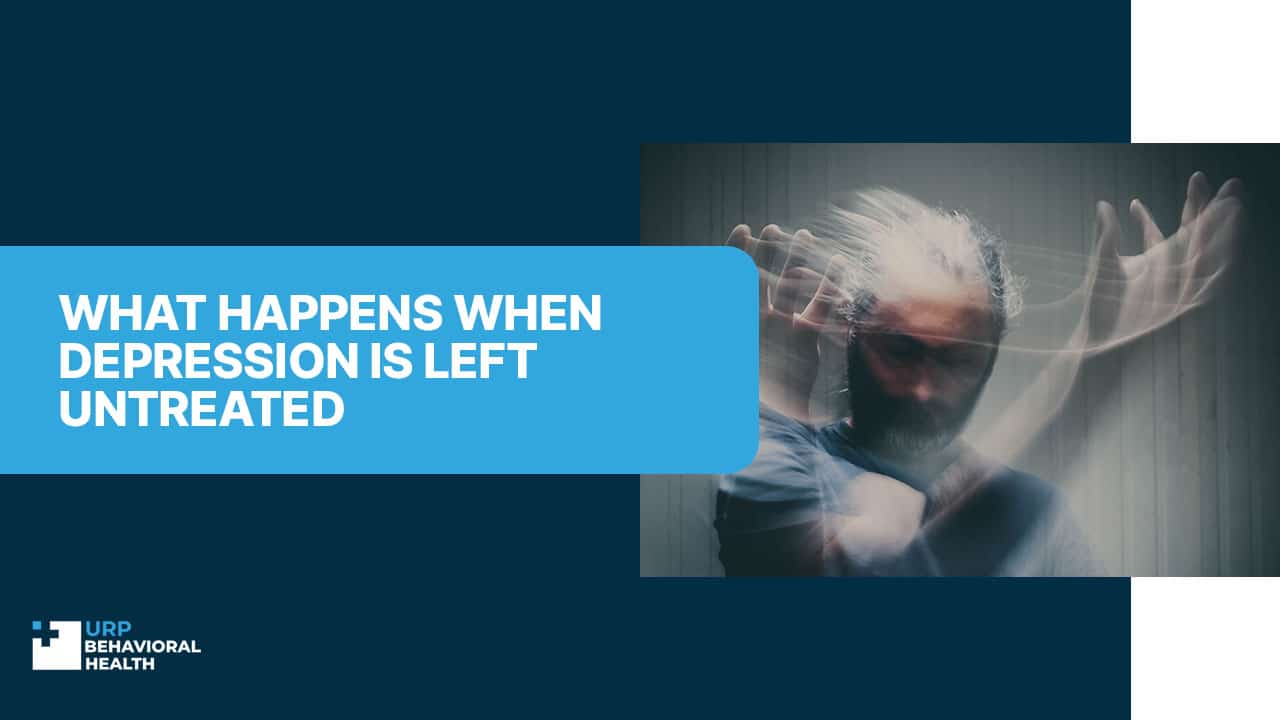
What Happens When Depression Is Left Untreated
All people can occasionally feel sad and distressed, but when low mood and overwhelming fatigue persist for over two weeks [1], it’s a reason to ponder about undiagnosed depression symptoms. Misconceptions associated with this clinical disorder may deter individuals from seeking treatment and cause numerous severe consequences. Let’s shed a ray of light on what can untreated depression lead to and find out when it’s time to sound the alarm.
Understanding Depression
Given that nearly 21 million American adults experienced depressive episodes in a year [2], the spread of the data about risks of untreated depression seems reasonable. Let’s understand what happens when depression goes untreated and how it manifests in every facet of life.
Definition of depression
Depression is a perplexing medical illness associated with enduring melancholy, despair, and harrowing symptoms in the body [3]. Symptoms of untreated depression can negatively affect a person’s ability to manage their thoughts, emotions, and demeanor. Depending on the condition severity, these signs can range from tiredness to suicidal ideation and hinder the completion of routine tasks and maintaining relationships.
A person who suffers from depression has no interest in activities they once liked. Without appropriate treatment, they can’t merely get a grip on themselves, so it’s vital to seek professional help as soon as you notice the early signs.
Contact our admissions team now to begin your path toward a brighter future.
Common symptoms of depression
Symptoms of clinical depression can vary based on individual peculiarities and condition severity, but they typically include [1]:
- Consistent sadness lasting for an extended period;
- Lack of interest in hobbies or socializing;
- Notable shifts in weight or eating habits;
- Insomnia or sleeping too much;
- Feeling decelerated on a physical and mental level;
- Low energy or fatigue after having rest;
- Low self-worth and overpowering guilt over perceived failures;
- Difficulties with concentration, memory, and decision-making;
- Reflections about suicide or self-destructive behaviors;
- Feeling irritated.
Untreated depression can lead to hazardous outcomes, including devastating effects on the brain and body, disrupted relationships, and disability in work and social life. It’s very tough to cope with this mental disease alone, and no one has to. Seeking treatment is crucial to avert the effects of long term depression and foster better emotional and physical health.
Types of depression
Clinicians differentiate several types of depression [1]:
- Major depression is characterized by five depressive symptoms and happens in episodes;
- Dysthymia is not as severe as major depression, but it commonly lasts longer;
- Psychotic depression: encompasses intense feelings of hopelessness, guilt, and self-loathing, hallucinations, and profound social withdrawal;
- Bipolar disorder: depressive symptoms alternate with manic, when a person has elevated mood, rapid speech, reduced need for sleep, and is engaged in reckless behaviours;
- Perinatal depression: women can experience it during pregnancy and after childbirth. The condition involves profound sadness, apprehension, and tiredness [4].
The latter type can pose risks to both the mother’s and baby’s well-being, so seeking professional help is paramount to get the support and guidance and manage debilitating depressive signs.
Risks of Untreated Depression
Neglected depression can drag a person into a vicious cycle of exhausting moods and ideas and threaten physical health. Let’s more precisely explore what happens if depression is left untreated.
Untreated depression symptoms
When untreated, depression can persist for weeks, months, and even years. Many people don’t understand that the symptoms they encounter are depressive. They can attribute extreme energy loss to mere fatigue, difficulty concentrating – to demanding workload, and weight fluctuations – to an unregulated day schedule, or lack of willpower.
Such an attitude can prevent people with this undiagnosed clinical disorder from seeking professional help. Admitting one’s “weaknesses” seems too overpowering to bear, inducing them to endure the condition on their own. However, it leads to hazardous consequences of untreated depression, such as worsening symptoms and even suicidal ideation. Trouble falling asleep can lead to problems in work life, and pronounced irritability – to issues in family life and social interactions.
Will depression go away on its own?
No, it doesn’t work like this. Depression has recurrent and chronic forms [5], meaning it’s vital to address an expert clinician if you suspect you may be depressed. Even though it might seem easier at times, depressive disorder can be triggered by life-changing events, such as giving birth or losing a job.
We’ll help you understand your options and guide you toward care.
Consequences of untreated depression
Depression untreated consequences are devastating in both short- and long-term perspectives. Without adequate medical attention, the disorder can lead to:
- occurrence of anxiety disorders and other mental illnesses;
- recurrent depressive episodes;
- suicidal ideation;
- personality alterations;
- appearance of somatic diseases and eating disorders;
- problems with maintaining a stable weight;
- potential sexual dysfunctions;
- diabetes;
- heart attack, stroke;
- chest or stomach pains, and more.
- Loneliness that often accompanies depressive episodes can exaggerate the problems and provoke life-threatening effects.
Impact on Physical Health
Let’s clarify the “What are the long term effects of depression?” issue to understand the health-related risks of not seeking treatment.
Effects of long-term depression
If a person ignores depression, it can affect physical health poorly, potentially causing:
- dementia development [6];
- substance abuse;
- heart disease;
- diabetes;
- arthritis;
- COPD [7];
- hypertension;
- chronic physical conditions.
The need to constantly fix the effects of depression can prevent a person from living a full-fledged life and cause an inability to cope with life’s challenges.
Untreated depression can lead to chronic illnesses
People with major depression can develop chronic diseases lasting at least one year, enticing them to undergo medical treatment. They include [8]:
- diabetes;
- stroke;
- heart disease;
- pain;
- Alzheimer’s disease;
- osteoporosis, and more.
As these health conditions progress, they can limit activities of daily living. Medical care in the early stages of physical health issues can help to suspend the development of chronic illnesses.
Physical symptoms associated with untreated depression
Clinical depression can be marked by such prominent physical symptoms as:
- chronic pain in joints, limbs, or back;
- trouble with the stomach;
- heart problems;
- fatigue;
- changes in sleep and appetite;
- heightened sensitivity to physical pain.
Getting control over these symptoms is almost impossible without quality medical help. It has been proven that depression causes various brain changes and impacts mood, cognition, and emotion regulation [8], meaning it might be challenging for patients to pull themselves out of bed. Support from close ones can promote timely professional assistance.
Psychological and Social Consequences
Untreated depression not only affects mood but can also impair relationships and cause problems at work.
Emotional and cognitive effects
Depression negatively impacts emotional processing and mood regulation. Changes in the brain caused by depressive disorder can undermine cognitive abilities, including memory, rationality, and decision-making. A person can engage in risky behaviors such as severe drinking or drug use, resulting in trouble in relationships and work.
Consequences of untreated depression on relationships
Family and friends can become a solid footing for depressive patients, though they should understand it might be a stressful experience. If a person neglects depressive signs, with time, they may find it arduous to develop or maintain new relationships. This condition is often marked by social isolation [9], making personal relationships fall apart.
Impacts on career and daily functioning
Depression commonly doesn’t prevent people from being employed, but it hinders their productivity due to fatigue and difficulty concentrating. People may become irritable with coworkers and have trouble with daily responsibilities. It’s crucial to address a healthcare provider at the onset of the disorder to avoid a decline in one’s well-being and more challenging treatment in the future.
Our team will verify your insurance and design a plan tailored to your needs.
Importance of Seeking Help
Almost 70% of depressive patients show significant improvement when they are treated with early diagnosis, expert intervention, and family support. When they learn actionable coping mechanisms and get essential medical assistance, it can speed up recovery.
How to identify signs of worsening depression
Progressive depression can manifest in iterative sleep disruptions, heart disease, physical pain, substantial weight gain or loss, and a frail immune system. A person might struggle to care for their basic needs. In severe cases, depression can cause thoughts of suicide. A person can alleviate the negative impact of this clinical disorder and prevent the long-term effects on their physical, mental, and emotional well-being by seeking treatment.
Treatment options available
Tailored treatment options provide numerous benefits for people with depression, helping them live a healthier and fuller life. As a rule, these comprise individual psychotherapy, medications, or their combination. Alternative treatments could include electroconvulsive therapy and transcranial magnetic stimulation. Certain lifestyle changes are also required to effectively cope with the negative effects of the condition.
Encouraging open dialogue about mental health
Depression may make a person avoid seeking help and support, but it’s crucial to leave that gloomy cave to take a proactive step toward healing. The fitting treatment can help people manage debilitating symptoms and promote emotional and physical health. Don’t hesitate to talk to a professional about your concerns, as your honesty ensures an accurate diagnosis and acceptance of suitable treatment options.
References:
- Queensland Government. Chronic Conditions Manual. Section 4 – Management of diagnosed conditions. Depression. Link: https://www.ccm.health.qld.gov.au/management-of-diagnosed-conditions/depression. Access date: July 28, 2025.
- National Institute of Mental Health. Major Depression. Link: https://www.nimh.nih.gov/health/statistics/major-depression#:~:text=disorders%2C%20or%20medication.-,Prevalence%20of%20Major%20Depressive%20Episode%20Among%20Adults,more)%20races%20(13.9%25). Access date: July 28, 2025.
- National Institute of Mental Health. Depression. Link: https://www.nimh.nih.gov/health/topics/depression. Access date: July 28, 2025.
- National Institute of Mental Health. Perinatal Depression. Link: https://www.nimh.nih.gov/health/publications/perinatal-depression. Access date: July 28, 2025.
- S.M. Monroe, K.L. Harkness. Is depression a chronic mental illness? Psychol Med. 2012 May; 42(5): 899-902. Link: https://pubmed.ncbi.nlm.nih.gov/21995936/. Access date: July 30, 2025.
- Amy L. Byers, Kristine Yaffe. Depression and Risk of Developing Dementia. Author manuscript published in Nat Rev Neurol. 2011 May 3; 7(6): 323–331. Link: https://pmc.ncbi.nlm.nih.gov/articles/PMC3327554/#:~:text=Abstract,increase%20in%20risk%20of%20dementia. Access date: July 30, 2025.
- National Heart, Lung, and Blood Institute. What Is COPD? Link: https://www.nhlbi.nih.gov/health/copd. Access date: July 30, 2025.
- Simona Corina Trifu et al. Brain changes in depression. December 8, 2020. Link: https://pmc.ncbi.nlm.nih.gov/articles/PMC7864313/. Access date: July 30, 2025.
- Mengsha Luo. Social Isolation, Loneliness, and Depressive Symptoms: A Twelve-Year Population Study of Temporal Dynamics. October 31, 2022. Link: https://pmc.ncbi.nlm.nih.gov/articles/PMC9938924/. Access date: July 30, 2025.
















